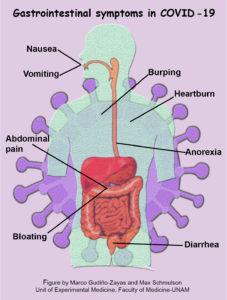Gastrointestinal Symptoms Can Be Manifestations of COVID-19
By Max J. Schmulson, MD
Although fever, cough, fatigue and shortness of breath are the most common symptoms of the novel COVID-19 pandemic, up to 40% of patients can manifest gastrointestinal (GI) symptoms during this viral illness. In order of frequency, the GI symptoms include diarrhea, nausea, loss of appetite or anorexia, vomiting, nausea, abdominal pain, belching and/or heartburn.
Most information comes from the experience in China. More recently, studies from Europe and the USA are also reporting GI symptoms among COVID-19 patients. Interestingly, in a subgroup of patients, the GI symptoms can be present even before fever or respiratory symptoms, while in other patients, the symptoms may be present during the clinical progression of the disease or even be the only manifestation of the viral infection. The latter have been termed atypical cases. Therefore, healthcare providers need to be aware of this possibility, especially in patients consulting for novel GI symptoms.
The presence of GI symptoms in COVID-19, have been reported mainly in hospitalized patients. Studies have tried to determine if the presence of these digestive manifestations are related to the severity of the disease, there is currently controversy about whether GI symptoms represent better or worse prognosis of the COVID-19. In addition, family clustering was higher among patients with GI symptoms.
For additional information on COVID-19 and how to cope with quarantine, see the video at our Rome Foundation website at: https://theromefoundation.org/q-a-covid-19/
Why can COVID-19 patients present GI symptoms?
SARS-CoV-2 (Severe Acute Respiratory Syndrome-Coronavirus-2) is the name of the virus responsible for the COVID-19 pandemic. To infect human beings, this virus requires the presence of a cell receptor called the angiotensin-converting-enzyme 2 receptor. This receptor is mainly located in the alveolar type II cells of the lungs, which is why the airway is the main source of human-to-human infection.
These receptors are richly expressed in the tongue, oral mucosa, esophagus, the terminal part of the small bowel (ileum), the colon, and biliary tree (digestive tract), as well as in other organs such as the heart, kidney and urinary tract. Therefore, it is possible that the infection can be acquired through the digestive tract. Also, as a consequence, fecal-oral transmission has been proposed.
In fact, the viral genetic particles have been detected in the feces. Some reports have informed of viral shedding in the stools for longer periods of time, even when the nasopharyngeal swabs have been negative. Notwithstanding, stool diagnostic testing for COVID-19 is not used in clinical practice.
How to prevent the fecal-oral transmission of COVID-19
No known preventive measures have been determined to avoid a fecal-oral transmission of the SARS-CoV-2. However, some reports from China associated the GI symptoms to family clustering, which suggests that toilet isolation measures should be implemented in households with positive cases of possible contacts of COVID-19. These measures are also implemented with other viral infections related to the digestive tract, such as Hepatitis A.
Can the COVID-19 be a risk for Post Infection-Irritable Bowel Syndrome (PI-IBS)?
A subgroup of patients develop IBS after a gastrointestinal infection that can be bacterial (e.g. Campylobacter jejuni), parasitic (e.g. Giardia) or viral (e.g. Norovirus), called PI-IBS. The COVID-19 is a novel viral infection illness for humanity, it has only been reported since December 2019. Therefore, its consequences in the long run, are still lacking. However, considering that a subgroup of patients develop PI-IBS after a viral gastroenteritis, and that the SARS-CoV-2 virus can apparently dock and enter the human body through cells located in the digestive tract, thus provoking GI symptoms, one may suspect that there is a potential for developing IBS post COVID-19. Observation and follow-up studies are required of patients who have recovered from COVID-19 to be able to answer this question.
References
- Schmulson M, D´avalos F, Berumen J, Beware: Gastrointestinal symptoms can be a manifestation of COVID-19, Revista de Gastroenterología de México (2020), doi: https://doi.org/10.1016/j.rgmx.2020.04.001
- Spiteri G, Fielding J, Diercke M, et al. First cases of coronavirus disease 2019 (COVID-19) in the WHO European Region, 24 January to 21 February 2020. Euro Surveill. 2020 Mar;25(9). doi: 10.2807/1560-7917.ES.2020.25.9.2000178.
- Nobel YR, Phipps M, Zucker J, Lebwohl B, Wang TC, Sobieszczyk ME, Freedberg DE, Gastrointestinal Symptoms and COVID-19: Case-Control Study from the United States, Gastroenterology (2020), doi: https://doi.org/10.1053/j.gastro.2020.04.017.
